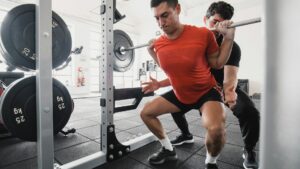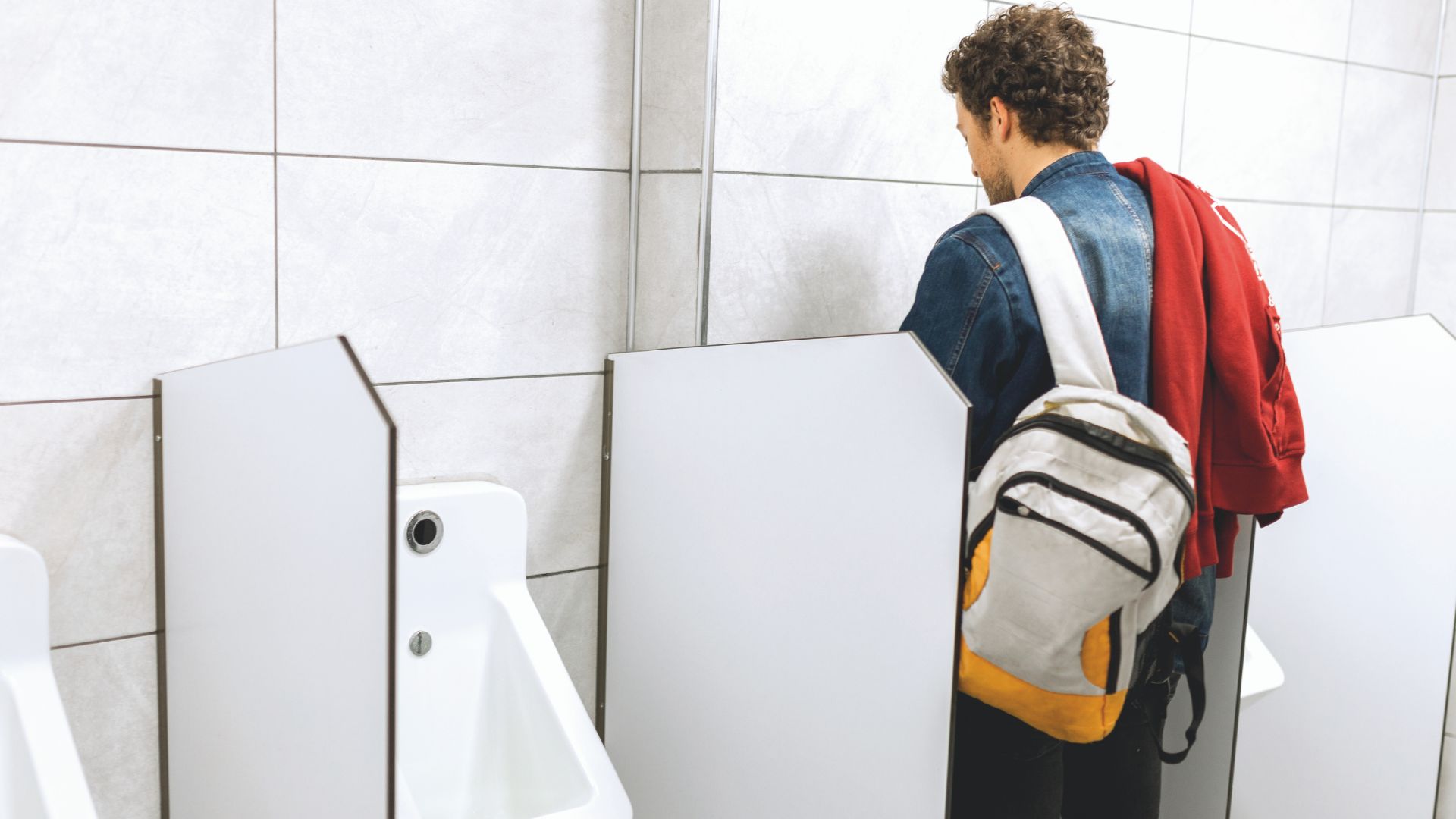Ever wondered whether that pre-squat bathroom break is really necessary? We’ve all been there, contemplating whether to heed the call of nature before hitting the gym.
In this blog post, we’re going to delve into the science and practicality of whether you should or shouldn’t try to pee before squatting.
Let’s settle this age-old debate once and for all and help you maximize your workout gains. So, grab your water bottle and let’s dive in!
Understanding whether to try to pee before squatting or not.
Especially if you anticipate that you might need to urinate during your workout, yes, it’s generally a good idea to empty your bladder before squatting.
Here’s why:
Comfort: Squats can put pressure on your lower abdomen and pelvic region. Having a full bladder can be uncomfortable during the exercise and may even affect your balance and form.
Focus: Going to the bathroom before your workout helps you stay focused on your squatting technique rather than worrying about the urge to pee.
Hydration: Staying hydrated is essential during exercise, but it’s better to drink water well before your workout and allow some time for your body to process it, so you’re not dealing with a full bladder while exercising.
Disruption: Having to interrupt your workout to use the restroom can be inconvenient and disrupt your training routine.
So, in summary, while it’s not strictly necessary to pee before squatting, it’s a practical step to ensure your comfort, focus, and uninterrupted workout.

Further Explanations.
Let’s dive deeper and explain further the point mentioned here.
First, though let’s break down how having a full bladder during squats can affect comfort and focus:
Discomfort due to Pressure.
When you perform squats, you engage various muscles in your lower abdomen and pelvic region.
These muscles help stabilize your core and support your spine during the exercise.
If your bladder is full, it occupies space in this region, and the added pressure from a full bladder can be uncomfortable.
This discomfort might lead to distraction and could even cause discomfort or pain while performing squats.
Balance and Form:
Maintaining proper balance and form is crucial during squats to prevent injury and maximize the effectiveness of the exercise.

When you have a full bladder, the added weight and pressure in your lower abdomen can throw off your balance.
This imbalance can lead to an uneven distribution of weight and improper squatting technique, which increases the risk of injury.
Additionally, the discomfort from a full bladder might cause you to shift your body weight in an attempt to alleviate the pressure, further affecting your form.
Mental Distraction:
Worrying about the urge to pee can be mentally distracting. During squats, it’s essential to concentrate on your technique, breathing, and muscle engagement.
If you’re preoccupied with the need to urinate, it can be challenging to maintain this focus.
This distraction might cause you to rush through your sets or compromise on your squatting form, both of which can increase the risk of injury and reduce the effectiveness of your workout.
In other words, ensuring you don’t have a full bladder before squatting is important for your comfort and safety.
It helps you maintain proper balance and form during the exercise and allows you to stay mentally focused on executing squats correctly, leading to a more productive and injury-free workout.
Let’s delve deeper into the importance of managing your hydration and avoiding disruptions during your workout:
Hydration.
Pre-Workout Hydration:
Staying hydrated is indeed vital for overall health and optimal exercise performance.
However, it’s generally recommended to hydrate adequately before your workout begins.
This allows your body enough time to absorb and process the fluids you’ve consumed, minimizing the chances of having a full bladder during exercise.
Timing Matters:
Drinking water right before or during your workout can lead to a more immediate need to urinate.
This can be particularly problematic during activities like squats, where you want to maintain focus and avoid interruptions.
By hydrating well in advance, you can strike a balance between maintaining hydration levels and not overloading your bladder right before exercise.
Disruption.
Interrupting Your Flow:
Having to use the restroom during your workout can disrupt the flow and continuity of your training session.
When you break your workout to address a full bladder, you may lose the momentum you’ve built up, which can affect your performance.
Additionally, it can be challenging to pick up exactly where you left off, and the interruption might lead to decreased motivation or a less effective workout overall.
Time Management:
Managing your time effectively during a workout is crucial, especially if you have a limited window for exercise. Frequent restroom breaks can eat into your allotted workout time, reducing the efficiency of your training session.
Safety Concerns:
In some cases, rushing to use the restroom during a workout can lead to accidents or injuries, especially if you’re in a hurry or not fully focused on your surroundings.
This underscores the importance of addressing the need to urinate before starting your exercise routine.
In summary, while it’s essential to stay hydrated, it’s equally important to time your fluid intake strategically to avoid having a full bladder during exercise.
This helps maintain your focus, prevent disruptions, and ensure a safe and effective workout experience.
A tabular on this topic here.
Here’s a tabular representation of whether or not you should try to pee before squatting:
| Factors | Reasons to Pee Before Squatting | Reasons Not to Pee Before Squatting |
|---|---|---|
| Comfort | – A full bladder can be uncomfortable during squats. | – If your bladder isn’t overly full, discomfort may not be a significant issue. |
| Focus | – A bathroom break helps you stay focused on your squat technique. | – If you’re not distracted by the urge to pee, you may maintain focus without a restroom break. |
| Hydration | – Pre-workout hydration is recommended, but timing matters. Drinking well in advance ensures hydration without a full bladder during exercise. | – Properly timed fluid intake can help you stay hydrated without the need for immediate urination. |
| Disruption | – Peeing before squats avoids interruptions, keeping your workout continuous and efficient. | – Frequent restroom breaks can disrupt your workout flow and motivation. |
This table provides a clear comparison of the reasons for and against trying to pee before squatting, helping you make an informed decision based on your specific circumstances and preferences.
Conclusion.
In conclusion, it’s generally advisable to try to pee before squatting. Doing so enhances comfort, maintains focus, and minimizes disruptions during your workout.
Proper hydration timing can also help you avoid a full bladder while ensuring you remain adequately hydrated.

Hey there, it’s Mike Rrsq, the Editor-in-Chief over at Jsquat.com, and I’m absolutely obsessed with all things squat fitness! I’ve been lucky enough to get some serious recognition for my work in this field. With a solid background in the fitness and wellness industry, I’ve been there right from the get-go, helping shape this website into what it is today.
You see, I’m not just the boss around here; I’m also a passionate contributor. I love sharing my insights through my articles, and trust me, they’re not your run-of-the-mill stuff. Each piece I write is a labor of love, filled with my expertise and real-world experience in the fitness universe. So, if you’re into fitness and looking for some inspiration, you’re in the right place!

